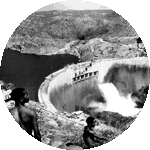
 |
||
 |
Years after the dam was completed in 1958, he was born in the area and this is where he wants to move back
and rejoin his family once he has finished his studies at an American
university. |
 |
 |

For the Tonga, the forced removal from the Valley was incomprehensible and some resisted for a while.
The social disruption was a cataclysm with families being split and members cut off from each other because of the barrier presented by the dam and, in 1964 by the political border with Zambia.
Life in the old valley, now under 300 feet of water has been somewhat romanticised. It is true that the Tonga lost the chance to take advantage of the rich alluvial waters of the Zambezi which allowed them to plant two crops a year but many remember the lean years when, even then, food was hard to come by.
The Tonga lost most of their material culture and they were forced to leave their shrines to be drowned by the flood waters. All the Tonga could take with them was their historical memory - their immaterial culture and, by investing in it, they survived.
Since 1980, life has gradually started to improve for the Tonga. Whereas, previously, they were suspicious of outsiders (not surprising under the circumstances) now there is a feeling that co-operation brings benefit. There are schools and clinics (although still not enough of them) which were built by government and local NGOs have helped with the bringing of clean water and sanitation to the area. A local businesswoman at Siachilaba brought a phone and electricity to the Siachilaba Business Centre.These are the only services needed for the installation of computers and connection to the net. In Binga, the first internet centre is already up and running.
There is still a long way to go before the wounds can be said to have completely healed and natural disasters like drought still have a serious effect on people in the area, but there is hope.
Ecologically, the flooding of the Zambezi Valley was also a disaster. Thousands of animals had to be trapped and brought onto higher ground. The whole balance of nature was put out of sync. Only now, half a century later, can the balance of nature now be said to have returned. Kariba provides Zimbabwe with most of its electricity, clean power which the Tonga are now tapping into when they move into cyberspace.
‘LO-FI Barrier: from the dam to disaster’ provides a background context on the effects of the building of Kariba and what has happened to people nearly fifty years on. You can see this daily in the electrolobby of the Brucknerhaus during the festival.